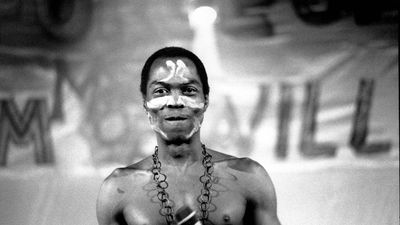Op-Ed: Fela's Nomination to the Rock & Roll Hall of Fame Should Have Come Decades Ago
Fela Kuti's nomination is a notable one, but it's long overdue. The Nigerian legend could become the first solo African artist inducted into the Rock & Roll Hall of Fame.
While Fela Kuti's nomination to the Rock & Roll Hall of Fame further reenforces his never-ending influence, it should have occurred perhaps a decade ago. A brief look into past awardees reveals no solo African artist has ever been inducted into the RRHOF. The two previous African artists had gotten in as members of a band—South African Trevor Rabin in 2017 as part of the band Yes and Freddie Mercury (who was born in Tanzania) in 2001 as a member of Queen.
At first, most Nigerians were expressionless to the news of Fela Kuti's nomination. It took Fela's son, Femi Kuti, Burna Boy, and several social media users to amplify the news of the nomination and the fan vote vital to the possibility of induction. But, why is this nomination just coming for Fela, who has been eligible for the RRHOF since 1996 but often overlooked?
For years now, the Rock & Roll Hall of Fame has been subjected to public outcry in its nomination and selection of artists for induction.The rules are simple—artists are only eligible for nomination 25 years after the release of their first album and only those who've had a significant impact on the evolution and development of rock and roll are inducted. Yet it's somehow not followed by the body who established them. Sister Rosetta Tharpe, often revered as the godmother of rock and roll, wasn't inducted until 2018.
Fans of the genre have questioned why artists with no affiliation or influence on the genre are been inducted or even considered—the latest one coming under scrutiny being Jay Z. But Fela Kuti's influence on rock & roll shouldn't be doubted. We must remember the influence Fela's afrobeat sound had on 1980s and '90s rock, with many being inspired by his artistry, taking bits from his music into their own.
David Byrne, a rock & roll legend inducted as part of the band Talking Heads had Fela Kuti's "Zombie" and "Expensive Shit" as inspiration. The whole band as a whole digested Afrodisiac, Fela's 1973 record, setting it as a template for their critically acclaimed Remain In Light, adapting Fela's polyrhythms and breathing his percussion style. They even named named an unfinished outtake on the album "Fela's Riff" (to further demonstrate the Nigerian legend's overbearing influence on the project. Remain in Light would go on to peak at Number 19 on Billboard 200 and also be certified gold in US, UK and Canada.
Not only David Byrne, Paul Simon, a fellow inductee was also inspired by Fela for his 1986 release, Graceland, a much larger incorporation of diverse African music. Graceland would go on ahead to win the Grammy award for Album of the Year in 1987.
These artists along with others like Brian Eno, Peter Gabriel have infused elements from Fela's records to better enhance their projects but yet, year after year since his demise in 1997, the RRHOF opted to stay in denial of his impact on the genre. Was it because Fela had died, perhaps his death had killed his chance of been inducted? History says no. Last year's induction had post-humous honorees: Whitney Houstonand Notorious B.I.G been inducted. These were artists who had recently just become eligible—Notorious B.I.G's debut album dropped 1994 and Whitney's came in 1985. All getting ahead of a pioneer who's inspired scores of rock and roll records we're oblivious of.
Fela's nomination is welcome, but it shouldn't stop there. It's a signal to the board at the Rock & Roll Hall of Fame they've sidelined and marginalized African music to an extent, especially as African music helped in the origin of rock & roll—a genre which owes its popularity to slaves who moved from here to the US.
- The Incredible Stories Behind Lemi Ghariokwu's Iconic Fela Kuti ... ›
- Kendrick Lamar Samples Fela Kuti In 'To Pimp A Butterfly' - OkayAfrica ›
- Watch Beyoncé Pay Homage to Fela Kuti During Her Coachella ... ›
- Fela Kuti's Queens - OkayAfrica ›
- Paul McCartney Smoked the Strongest Weed of His Life With Fela Kuti ›
- Fela Kuti ›
- Remembering Ginger Baker's Afrobeat Collaborations With Fela Kuti ... ›
